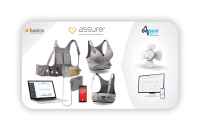ABBOTT PARK, Ill., Jan. 21, 2019 /PRNewswire/ — Abbott (NYSE: ABT) today announced U.S. Food and Drug Administration (FDA) approval of the TactiCath™ Contact Force Ablation Catheter, Sensor Enabled™, a new ablation catheter designed to help physicians accurately and effectively treat atrial fibrillation (AFib). The approval further expands Abbott’s portfolio of cardiac ablation tools that integrate with the company’s EnSite Precision™ cardiac mapping system to help physicians develop more precise images of the heart during cardiac ablation procedures.
Similar to Abbott’s other sensor enabled mapping and ablation treatment catheters, TactiCath (Sensor Enabled) SE delivers more precise images of the heart overlaid with real-time electrical activity information. The catheter also utilizes the advanced ergonomic design found in the company’s FlexAbility™ ablation catheter for superior reach and maneuverability during cardiac ablation procedures.
“Cardiac ablation has become a front-line therapy in the fight against conditions like atrial fibrillation in part because of improvements to the technology available today,” said Roger Winkle, M.D., an electrophysiologist at Sequoia Hospital in Redwood City, Calif., and one of the first physicians to treat patients with the newly FDA-approved catheter. “The Abbott TactiCath SE ablation catheter represents one of those major improvements, and offers an incredibly powerful, yet easy to use, combination of advanced technologies to improve ablation procedures.”
Technological Advancements in Cardiac Ablation
One of the most common cardiac arrhythmias in the world, AFib can affect how efficiently the heart pumps blood through the body, causing symptoms such as dizziness, shortness of breath or lightheadedness. The condition can also increase a person’s risk of stroke. To treat conditions like AFib, physicians can use ablation catheters to scar tissue in the heart that is generating abnormal electrical signals and disrupting a patient’s natural heartbeat. As the number of patients receiving cardiac ablation therapy worldwide has grown, Abbott has prioritized ablation technology that adds efficiency and accuracy to ablation procedures. Abbott cardiac ablation technology is currently used to treat patients in more than 84 countries worldwide.
Not all ablation technology is the same, however. Physicians have begun exploring the use of new tools such as “contact force” technology during ablation procedures to help them avoid applying too much pressure to heart tissue (resulting in complications) or insufficient pressure (which may reduce the effectiveness of the procedure). In addition, Abbott has also invested in technology to improve the accuracy of cardiac mapping to support cardiac ablation procedures.
Over the last two years, Abbott has expanded offerings within its electrophysiology portfolio to drive new growth and build on the company’s leadership. In addition to new clinical trials to further build clinical evidence surrounding cardiac ablation, the company has also launched the Advisor™ HD Grid Mapping Catheter, Sensor Enabled, and the FlexAbility™ Ablation Catheter, Sensor Enabled.
“TactiCath SE directly supports our goal of supporting fast, effective and safe cardiac ablation procedures,” said Srijoy Mahapatra, M.D., FHRS, medical director of Abbott’s Electrophysiology business. “As more physicians turn to cardiac ablation to treat AFib, Abbott’s goal is to equip them with the most advanced ablation catheters combined with the most advanced cardiac mapping on the market.”
About Abbott:
At Abbott, we’re committed to helping you live your best possible life through the power of health. For more than 125 years, we’ve brought new products and technologies to the world — in nutrition, diagnostics, medical devices and branded generic pharmaceuticals — that create more possibilities for more people at all stages of life. Today, 99,000 of us are working to help people live not just longer, but better, in the more than 150 countries we serve.
Connect with us at www.abbott.com, on Facebook at www.facebook.com/Abbott and on Twitter @AbbottCardio, @AbbottNews and @AbbottGlobal.
SOURCE Abbott






